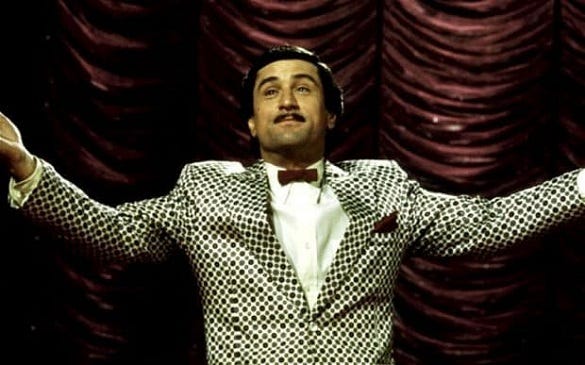The King of Comedy

With Robert DeNiro’s recent disastrous turn as grizzled stand-up comedian Jackie Burke in “The Comedian,” I was reminded of another time DeNiro played a comedian – this time to much loftier results. The year was 1983 – just seven years removed from his career-making turn in Martin Scorsese’s tour de force “Taxi Driver" and just three years removed from his Oscar-winning turn in Scorsese’s “Raging Bull.” This time Scorsese used DeNiro as a wannabe comedian named Rupert Pupkin. The differences between DeNiro’s boorish lout Jackie and the milquetoast but determined Pupkin are striking. Perhaps only DeNiro is capable of playing both characters so well. But the grave similarity is that neither is funny.
While Jackie is overconfident, Pupkin is a seemingly mild-mannered loner who dreams of making it big as a stand-up comedian. He practices in his basement, using a flashlight as a spotlight. He fantasizes about appearing on “The Jerry Langford Show” – a late-night program representing “The Tonight Show Starring Johnny Carson.” In an odd bit of casting, Jerry Lewis plays Langford – and quite convincingly, I might add. Pupkin is also an autograph hound, planting himself outside the rear entrance to Langford’s show every day to request the signatures of Langford’s guests.
Pupkin tries in vain to be granted an appearance on the show. Unsatisfied with the rejections of Langford’s staff, he manages to run through a little of his shtick for Langford himself, before receiving the proverbial boot. Still not satisfied, he shows up at Jerry’s house one afternoon – with a date, no less – and attempts to talk his way onto the show. Now remember, Pupkin has no handler, no agent, no “people.” He’s just some Joe Blow who thinks he’s funny. Ironically, some of his material isn’t bad. Personally, I find Pupkin’s jokes funnier than Jackie’s stuff in “The Comedian.” The problem is his delivery. DeNiro’s Pupkin is embarrassingly bad, and I’m certain Langford doesn’t want him to make a fool of himself on national television.
As “The King of Comedy” progresses, we wonder just how far Pupkin will go to make his fantasy come true. If this reminds you of a less dangerous version of DeNiro’s Travis Bickle character in “Taxi Driver,” it should. But soon we learn that Pupkin is every bit as deranged as Bickle, as he kidnaps Langford, ties him to a chair, and demands a spot on his show. The staff, network bigwigs, and even the FBI are notified, and all parties agree to allow Pupkin an appearance on that night’s show, with the assumption that Langford will be released as soon as the show is over. Tony Randall (playing himself) is brought in at the last minute as an emergency guest host, and a fellow celebrity stalker (played by Sandra Bernhard) watches Langford.
The audience reacts favorably to Pupkin’s act, applauding and laughing at the opportune moments. At the end, Pupkin admits he’s kidnapped Jerry and is holding him hostage, but the audience assumes it’s all part of the act. Pupkin is then arrested and jailed following his performance.
The ambiguous coda is classic Scorsese. We’re not sure if it’s reality or more of Pupkin’s fantasy world. And that’s the point. In the imbalanced mind of the obsessed, where does reality begin and fantasy end? Could the entire kidnapping episode itself have been a dream sequence? Picture “The Secret Life of Walter Mitty,” but with the sharp cuts between daydream and real life becoming increasingly blurred as the story progresses. To say Scorsese is the only director who could handle this material so adeptly would be an overstatement, although for the life of me, I can’t imagine anyone else capable of vividly bonding this story to my mind for 34 years and counting.
The comparisons to “Taxi Driver” are inevitable. While Rupert Pupkin is not violent (kidnapping aside), in a way his mind is less healthy than Travis Bickle’s. Bickle’s brain eventually snaps, as he unleashes a savage attack against those he perceives have wronged him. Pupkin never reaches that point. Bickle would have eventually killed Jerry Langford. Pupkin pushes the envelope of celebrity worship past the point of unimpaired societal norms. He is so driven, he’ll stop at nothing. He may not physically kill anyone, but he leaves a trail of mental illness a mile long. Johnny Carson was originally asked to play the part of Jerry Langford, but he turned it down, fearing copycat episodes from his own obsessed fans. Obsession is a very real disease, and Scorsese (working from an original screenplay by Paul Zimmerman) shoves it right in our faces.
Is “The King of Comedy” among Scorsese’s best? Not really, but that’s not saying much. Most directors never make a film this interesting. It’s not particularly enjoyable to watch, and it’s definitely not a comedy. But the illnesses of idolatry and obsessive fixation have never been stripped down and shown so skillfully on film. And that’s why it’s this month’s Buried Treasure.
Andy Ray's reviews of current films appear on http://www.artschannelindy.com/



